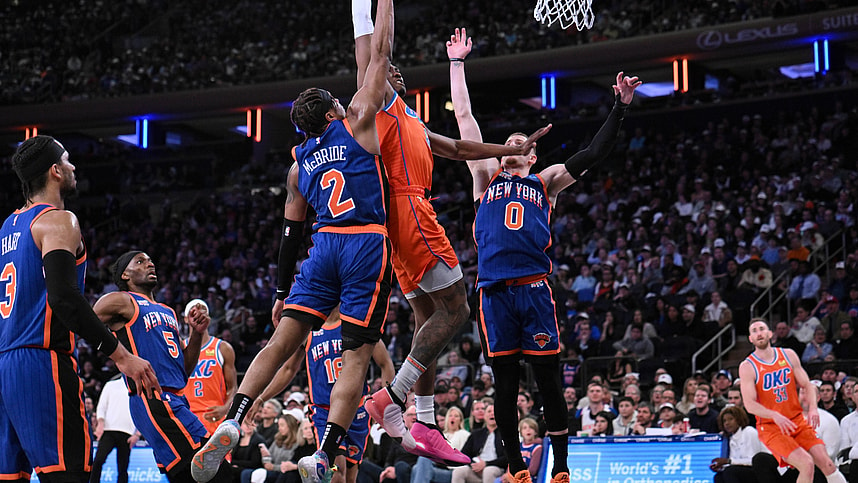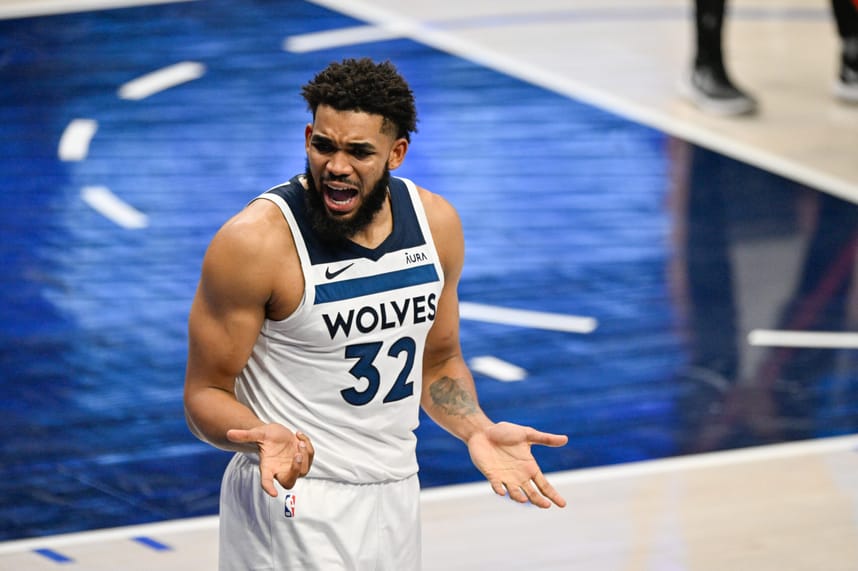
The Knicks‘ acquisition of Karl-Anthony Towns from the Minnesota Timberwolves has completely transformed the outlook of their starting five and bench rotation. With Towns slotting in as the new starting center, the ripple effects on the roster are significant, creating opportunities for both the starting lineup and the bench.
Towns’ Impact on the Knicks’ Starting Lineup
Towns’ arrival means that OG Anunoby will shift to the power forward role, allowing Josh Hart to step in as the starting small forward. While this adjustment strengthens the Knicks’ frontcourt, it also leaves a hole in the bench rotation, as Hart’s transition to a starting role and Donte DiVincenzo’s departure to Minnesota create new challenges for the second unit.

The bench now looks different, with Miles McBride emerging as the primary rotation option. With DiVincenzo moving on, McBride’s role is set to expand significantly, giving him a chance to showcase his talent even further.
McBride’s Emergence as a Key Bench Player
McBride, widely regarded as having one of the most team-friendly contracts in the league after signing a three-year, $13 million deal last offseason, is primed for a substantial increase in minutes. Last season, McBride made a name for himself with his scoring ability and defensive prowess, playing in 68 games and making 14 starts. He averaged a career-high 19.5 minutes per game, contributing 8.3 points, 1.5 rebounds, and 1.7 assists while shooting an impressive .452 from the field and .410 from beyond the arc.
Despite having less shooting volume than DiVincenzo, McBride’s accuracy from three-point range was higher, making him a strong candidate for Sixth Man of the Year. His shooting touch and defensive skills will be vital in maintaining the Knicks’ depth and flexibility off the bench.

Payne and Kolek Provide Additional Support
To bolster their backcourt, the Knicks also signed Cameron Payne and drafted Tyler Kolek. Both players showed promise in their first preseason game, with Kolek standing out thanks to his playmaking and defensive efforts. These secondary ball handlers will take some of the pressure off Jalen Brunson, allowing McBride to focus on his strengths as a shooter and defender.
With Payne and Kolek handling the ball, McBride can play off the wing, where he excels as a shooter and can continue to provide elite defense against opposing guards. His ability to contribute on both ends of the floor makes him a critical piece of the Knicks’ rotation moving forward.
McBride’s Postseason Potential
McBride has already shown his potential in the postseason, averaging 11 points per game and shooting .435 from the field in 13 playoff appearances last season. His defensive intensity was crucial in the Knicks’ playoff run, as injuries forced the team to rely heavily on their bench. McBride stepped up, proving that he could handle the pressure of high-stakes games.
Looking ahead to the upcoming season, McBride is expected to play an even bigger role, especially in the wake of DiVincenzo’s departure. His progress over the past year has been impressive, and he is ready to embrace his new responsibilities as the primary rotational shooting guard.
- Knicks 107, Sixers 116: Good news and bad news as Knicks’ winning streak is snapped
- Knicks’ two-way center shows off impressive defense in win over Pacers
- Tyler, The Creator: Knicks’ Tyler Kolek is developing rapidly in the new system
The Road Ahead for McBride and the Knicks
With an improved roster and increased expectations, McBride will be a key player for the Knicks this season. His ability to defend at a high level, coupled with his offensive efficiency, makes him an integral part of the team’s success. As he steps into a more prominent role, McBride has the opportunity to establish himself as one of the top bench players in the league, helping the Knicks compete for a deep playoff run.
More about: New York Knicks